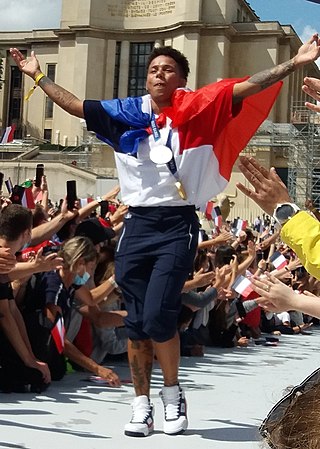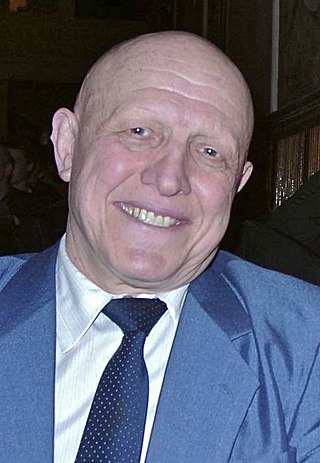
The judo competition at the 1964 Summer Olympics was the first time the sport was included in the Summer Olympic Games. As a result, decades of judo being banned in the Soviet Union ended shortly before in order to gain medals. They were awarded in 4 classes, and competition was restricted to men only. The competition was held in the Nippon Budokan, which was built to host the competition.

Sambo is a martial art with Soviet origins, an internationally practised combat sport, and a recognized style of amateur wrestling included by UWW in the World Wrestling Championships along with Graeco-Roman wrestling and freestyle wrestling.

The International Judo Federation (IJF) is the international governing body for judo, founded in July 1951. The IJF was originally composed of judo federations from Europe and Argentina. Countries from four continents were affiliated over the next ten years. Today the IJF has 200 National Federations on all continents. There are over 20 million people around the globe who practice judo, according to the IJF.

Yasuhiro Yamashita is a Japanese judoka. He currently works as an instructor or advisor for numerous organizations, including Tokai University, the International Judo Federation, and the All Japan Judo Federation. He retired from competitive judo on 17 June 1985 after a remarkable career where he won five gold medals in international competitions and marked 203 consecutive victories until his retirement where he went undefeated his entire career against non-Japanese wrestlers. He received the Japanese National Prize of Honor on 9 October 1984. He is considered the greatest judoka ever.

The World Judo Championships are the highest level of international judo competition, along with the Olympic judo competition. The championships are held once every year by the International Judo Federation, and qualified judoka compete in their respective categories as representatives of their home countries. Team competitions have also been held since 1994. The men's championships began in 1956, though the format and periodicity of the championships have changed over time. The last edition of the championships took place in Doha, Qatar in 2023.

Karina Bryant is a British retired elite judoka, who was active in elite senior competition in the 2000's and early 2010's. She represented Great Britain at four successive Olympics between 2000 and 2012, winning her first Olympic medal, a bronze, in the heavyweight event at her final Games, the 2012 Summer Olympics in London. She was a seven-time medallist at both the European Judo Championships and the World Judo Championships, and was European Champion on four occasions.
David Rudman was a Russian-American wrestler, Sambo world champion, and judo European champion.
The 1965 European Judo Championships were the 14th edition of the European Judo Championships, and were held in Madrid, Spain, from 23 to 24 May 1965. The Championships were held in two separate categories: amateur and professional. The amateur contests were subdivided into six individual competitions, and a separate team competition. As the Soviet and other Socialist judokas were competing on a strictly non-profit basis, they were allowed to compete both professionally, and as amateurs. As before, more than one representative of a single national team were allowed to qualify for participation in each event.
The 1963 European Judo Championships were the 12th edition of the European Judo Championships, and were held in Geneva, Switzerland on 11 May 1963. The Championships were held in two separate categories: amateur and professional. The amateur contests were subdivided into four individual competitions, and a separate team competition. The Soviet and other Socialist judokas were allowed to compete professionally but on a strictly non-profit basis. As before, more than one representative of a single national team were allowed to qualify for participation in each event.
The 1966 European Judo Championships were the 15th edition of the European Judo Championships, and were held in Luxembourg City, Luxembourg from 6 to 7 May 1966. Championships were subdivided into six individual competitions, and a separate team competition. Individual events were not discriminated into amateur and professional as before.
The 1970 European Judo Championships were the 19th edition of the European Judo Championships, and were held in East Berlin, East Germany from 21 to 24 May 1970. Championships were subdivided into six individual competitions, and a separate team competition.
The 1968 European Judo Championships were the 17th edition of the European Judo Championships, and were held in Lausanne, Switzerland from 17 to 19 May 1968. Championships were subdivided into six individual competitions, and a separate team competition.
The 1969 European Judo Championships were the 18th edition of the European Judo Championships, and were held in Ostend, Belgium from 15 to 18 May 1969. Championships were subdivided into six individual competitions, and a separate team competition.
The 1962 European Judo Championships were the 11th edition of the European Judo Championships, and were held in Essen, West Germany on 12 and 13 May 1962. The Championships were held in two separate categories: amateur and professional. The amateur contests were subdivided into weight classes, experience classes, and a separate team competition. The professional contests were subdivided only into weight classes. It was the first edition of the European Judo Championships to host judokas from the Socialist countries, though they did not participate in the professional contests as professional sports were banned in those countries. Contrary to the modern Olympic-based practice of entering one athlete per weight class, more than one representative of a single national team was allowed to qualify for participation in each event. The professional category was established for those teaching judo, and hence not considered amateurs in the Olympics' category. This later precluded Anton Geesink from participating in the amateur weight classes at the judo event of the 1964 Olympics.

The Japanese martial art and combat sport judo has been practised in Canada for over a century. The first long-term judo dojo in Canada, Tai Iku Dojo, was established by a Japanese immigrant named Shigetaka "Steve" Sasaki in Vancouver in 1924. Sasaki and his students opened several branch schools in British Columbia and even trained RCMP officers until 1942, when Japanese Canadians were expelled from the Pacific coast and either interned or forced to move elsewhere in Canada due to fears that they were a threat to the country after Japan entered the Second World War. When the war was over, the government gave interned Japanese Canadians two options: resettle in Canada outside of the 'Japanese exclusion zone' or emigrate to Japan.
This is a list of achievements in major international judo events according to gold, silver and bronze medal results obtained by athletes representing different nations. The objective is not to create a combined medal table; the focus is on listing the best positions achieved by athletes in major global events, ranking the countries according to the most number of podiums accomplished by athletes of these nations. In order to be considered for the making of the list, the competition must be open to athletes from nations across every continent, with no cultural, geographical, political or other sort of limitation preventing participation of athletes. Invitational-only events were not eligible because they might impose subjective limitations on which athletes are allowed to compete.

Amandine Buchard is a French judoka. She represented France at the 2020 Summer Olympics and won the silver medal in the half lightweight event, and a gold medal in the mixed team event. She is a third degree black belt.
Claire Lecat is a former French judoka, under 66 kg category. She was born on July 6, 1965, in Boulogne-sur-Mer, Pas-de-Calais, France. She studied in the Sport-Studies Program in Poitiers, then joined INSEP. She was member of the France Women's Judo Team at seventh dan black belt, and competed in the women's middleweight event at the 1992 Summer Olympics.

Michaela Polleres is an Austrian judoka. In 2021, she won the silver medal in the women's 70 kg event at the 2020 Summer Olympics in Tokyo, Japan. She is also a bronze medalist at the 2021 World Judo Championships and the 2018 European Judo Championships. She is a third degree black belt.

Ilya Lazarevich Tsipursky was a Soviet judoka and sambist. He participated at the 1964 European Judo Championships, being awarded the silver medal in the amateurs's 80 kg event. He was in the middleweight class.










